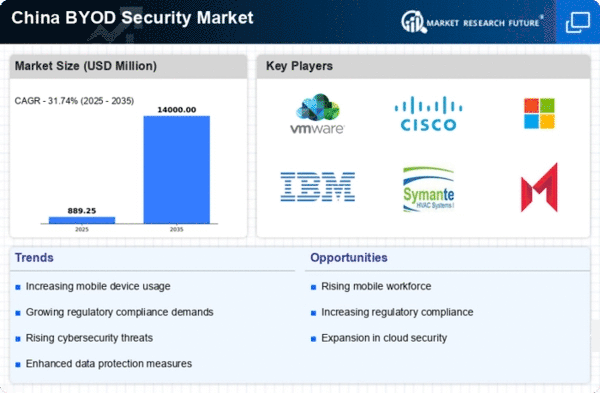Rising Mobile Workforce
The increasing prevalence of remote work in China has led to a substantial rise in the mobile workforce. As employees utilize personal devices for work-related tasks, the byod security market experiences heightened demand for robust security solutions. According to recent data, approximately 70% of organizations in China have adopted some form of BYOD policy, necessitating advanced security measures to protect sensitive information. This trend indicates a growing recognition of the need for comprehensive security frameworks that can safeguard corporate data accessed through personal devices. Consequently, the byod security market is likely to expand as businesses seek to mitigate risks associated with mobile device usage, ensuring compliance with data protection regulations and maintaining operational integrity.
Increased Cybersecurity Threats
The landscape of cybersecurity threats in China has evolved, with a notable increase in sophisticated attacks targeting organizations. This surge in cyber threats has prompted businesses to prioritize security measures, particularly in the context of the byod security market. Reports indicate that cyber incidents have risen by over 40% in recent years, compelling companies to invest in advanced security solutions. As personal devices become potential entry points for cybercriminals, the demand for effective security protocols is likely to escalate. Organizations are increasingly aware that a robust byod security strategy is essential to protect sensitive data and maintain customer trust, thereby driving growth in the byod security market.
Growing Awareness of Data Privacy
In China, there is a burgeoning awareness of data privacy among consumers and businesses alike. This heightened consciousness is driving organizations to adopt stringent security measures, particularly in the byod security market. As data breaches become more prevalent, companies are compelled to implement robust security protocols to protect sensitive information. Surveys indicate that over 60% of consumers express concern about their data privacy, prompting businesses to prioritize security in their BYOD policies. This trend suggests that organizations are increasingly recognizing the importance of safeguarding customer data, which in turn fuels the demand for advanced security solutions within the byod security market.
Regulatory Pressures and Compliance Requirements
The regulatory landscape in China is evolving, with new data protection laws and compliance requirements emerging. These regulations are compelling organizations to reassess their security strategies, particularly concerning the byod security market. Companies are now required to implement comprehensive security measures to protect personal data, leading to increased investments in security solutions. Recent legislative changes indicate that non-compliance could result in substantial fines, further motivating businesses to adopt robust BYOD security policies. This regulatory pressure is likely to drive growth in the byod security market as organizations strive to meet compliance standards while safeguarding sensitive information.
Technological Advancements in Security Solutions
The rapid advancement of technology in China has significantly influenced the byod security market. Innovations such as artificial intelligence and machine learning are being integrated into security solutions, enhancing their effectiveness in detecting and responding to threats. As organizations seek to leverage these technologies, the market for byod security solutions is expected to grow. Recent studies suggest that the adoption of AI-driven security measures could reduce incident response times by up to 50%, making them an attractive option for businesses. This trend indicates a shift towards more proactive security strategies, as companies aim to stay ahead of potential threats while ensuring compliance with regulatory standards in the byod security market.
















